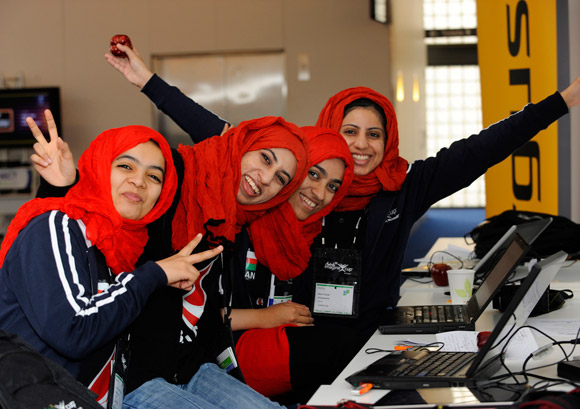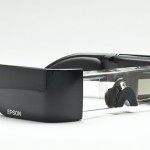
(The all-girl team from Oman. Photo credit: Microsoft)
In just one day, 73 teams of Imagine Cup hopefuls in the Software Design category have been whittled down to 20. As these students – including Singapore’s team – proceed to Round 2 of the competition, Techgoondu checks out some of the interesting student projects on display in this flagship category.
Australia – StethoCloud
Pneumonia kills 2 million children every year – more than measles, malaria, and HIV combined – and the key to its cure is early diagnosis. Unfortunately, many developing countries lack adequate resources for successful early detection.
StethoCloud’s solution involves a device engineered from a stethoscope and a standard 3.5mm audio jack, and is tremendously easy to use. Simply plug the audio jack into a Windows Phone, fire up the custom app, and place the stethoscope on a child’s back.

The app will record the child’s breathing pattern, sends it to the cloud where a self-developed algorithm strips away noise and optimises the breathing pattern for analysis. It can detect pneumonia with an impressive 90 per cent accuracy (even human doctors can’t do 100 percent). The team promises that diagnosis rates will improve as data accumulates over time.
The great thing about this StethoCloud is its price: the team expects its stethoscope to cost no more than US$20. There is also a version of the app for cheap Nokia feature phones. It can be operated without the presence of trained medical professionals, and as soon as pneumonia is diagnosed in a village, the child can be rushed off to the nearest doctor, potentially saving his or her life.
Korea – Let IT Bee
Honey bees are disappearing, and we have no idea why. If these bees die out, our ecosystem and food supply is in serious trouble as these little bugs pollinate more than 90 percent of our crops.
The team from Korea came up with a device, which is installed in bee hives, to monitor hive activity. The data is then sent to the cloud for analysis and storage, and users can access the information anywhere using a Windows Phone app or Web browser.
This data should also be useful to researchers trying to get to the bottom of the mystery, hopefully before it’s too late.
Germany – Greenway
Navigation systems with traffic information are a boon to peak period drivers, but there’s just one small but significant problem. If all drivers see that a particular road is crowded and take the same alternative route, they will just be shifting the jam elsewhere!
Greenway acts like a traffic orchestra master by using a distributed routing algorithm in real time. In other words, instead of directing other cars onto other roads after the jam occurs, Greenway actively attempts to prevent the jams from occurring altogether. Every car is tracked, and an optimal route calculated in a matter of milliseconds.

Based on a simulation scenario here, the Windows Phone app enabled traffic to flow two times faster than traditional navigation systems. At the end, the app will display the amount of fuel saved (2 litres in the case of the simulation) which can be significant when viewed on a macro level.
The team does not intend to focus on creating its own navigation app, but will offer an API for mapping software companies to use, so we might be seeing it in the real world soon.
Oman – Blood IT
Blood banks are perpetually in need of more blood, and sometimes this reaches a critical point, such as during a bad traffic accident.
In such an emergency, Blood IT will locate the nearest potential donors of the needed blood group via a GPS system, and automatically send out an SMS to these people, who can respond and confirm that they are willing to donate immediately.
If there are no donors nearby, it will locate other blood banks and hospitals nearby and request for blood. Every second in these emergencies count, and could mean the difference between life and death, especially in Oman, one of the countries in the world with the highest traffic accidents.
And more!
It’s impossible to cover all these innovations by students in one article, and the top 20 teams each have its own brilliant world-changing idea. The competition continues to reaffirm that students play an important role in the tech world. After all, Bill Gates, Mark Zuckerberg, Steve Jobs are their like were all students when they started their companies.
You can view and vote for your favourite here.






